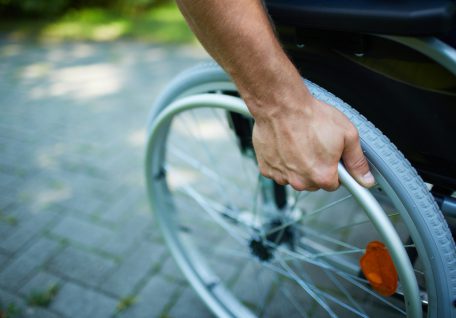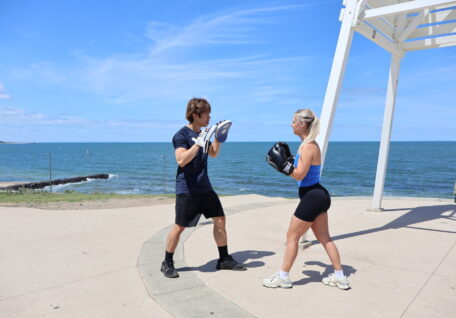Summer is approaching, the mornings and evenings are getting lighter and you are looking for a new challenge to boost your fitness and get you motivated.
The fun run season is approaching, so why not have a try? Setting yourself a running goal can be a great way to give your fitness a much needed boost. Running is a great cardio activity and you’ll likely shed a few kilograms as your fitness improves.
The following tips will help you to achieve your running goals and prepare you for a fun run.
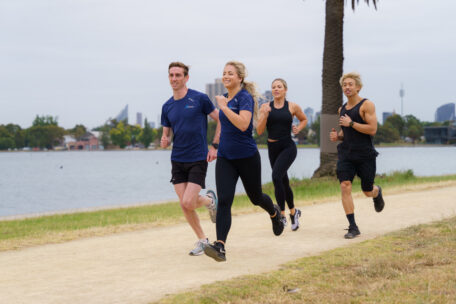
Choose a run of an appropriate distance
If you only have 8 weeks to prepare, don’t choose a marathon or half marathon! Be realistic about how fit you can get in the timeframe you have. Sure, you might struggle through a half marathon but at what cost? Are you going to be so sore that it will potentially stop you from exercising for days or even weeks afterwards? Worse still, it may lead to injury that restricts you from participating in other activities you enjoy. Depending on your initial fitness level, a 5 – 10km event is a reasonable option if you have 8 weeks to prepare. Four to six months of preparation is recommended for a half marathon while a full marathon will likely need six months or more.
Plan your training
As a guide, only increase your training volume by approximately 10 – 20% per week. For example, if you start with 2 x 5 km runs in the first week, you might increase this to 2 x 6 km in week two (or 3 x 4 km). Sensible increases in volume will reduce the risk of injury.
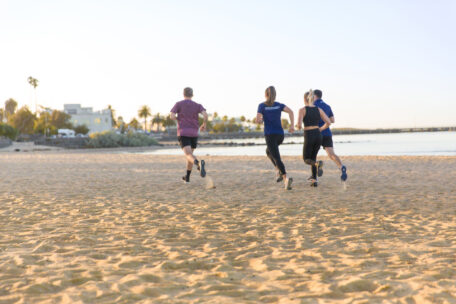
Specificity vs Variety
To improve your running speed and endurance for the race you actually have to run in training! While training on the cross-trainer, bike or stepper is better than not training at all, you definitely need to include regular running in your exercise program. Furthermore, running outdoors on a variety of surfaces will be more beneficial than running indoor on the treadmill. Check out the terrain for the event and try to replicate it in your training. If the course is hilly, include some uphill and downhill running in your preparation. If it is held on the road, incorporate some training on harder surfaces so your legs become accustomed to the extra pounding effect. Running on a treadmill only prepares you for running in a straight line on an even surface. How many fun runs do you know of that are like that??
Use technology for extra motivation
With the range of technical devices available to monitor your exercise, they can actually increase your motivation. You might wish to consider the following:
- GPS – GPS watches and apps available on smart phones enable you to track your training runs to monitor the distance travelled, average speed, maximum speed and elevation throughout the course. You can record these and compare your training runs to monitor your improvement. Many of these link in to software programs that graph the results and show maps of your courses.
- Bluetooth headphones – listen to your favourite music while you run. Some people find they run much better when they have their favourite tracks accompanying them. But a word of caution, be very careful if you run with headphones on, particularly near roads or along busy paths because you won’t hear anyone or anything coming up behind you!
- Smart Watch – these devices can count your steps and provide an indication of distance travelled, heart rate and other metrics that can be useful for your training. Most runners would be familiar with heart rate training ‘zones’ which provide an indication of how hard they are working. Higher heart rates occur with more intense exercise. Wearing a smart watch may be useful if you are inclined to go out too hard at the start of your run and tire early. Through your training you can identify the heart rate zone that correlates to a pace you can maintain for the entire run.
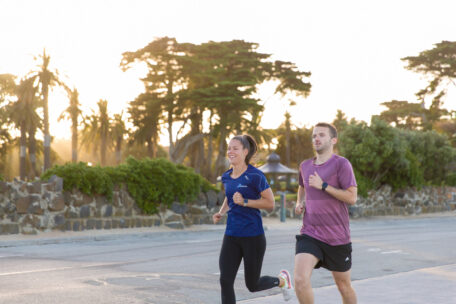
Fads and Trends
Like most forms of exercise there are always new trends in running, particularly when it comes to the latest in clothing, footwear and hydration. One of the benefits of running is that it is a low cost form of exercise. A decent pair of runners will cost $100 – $200 and you don’t necessarily have to outlay a whole lot more. But for comfort you should check out the range of purpose designed clothing, particularly those that prevent chaffing and assist in keeping you cool while you run.
It is recommended you buy your runners from a specialist retailer so they can check your running biomechanics to determine whether you need additional support for pronation and supination. Minimalist shoes are a current trend and without going into too much detail regarding the positives and negatives (maybe a topic for another article), they take a bit of getting used to! So don’t buy a pair of them 2 weeks before your event and expect them to significantly reduce your time.
While hydration is important, unless you are training for an ultramarathon don’t waste your money on energy gels that can be consumed on the run. A sensible eating plan prior to and after exercise will be sufficient. Fun runs include drink stations every few kilometres and these are ample for the needs of the majority of runners. In your training make sure you are well hydrated before your run and drink 1 – 2 litres afterwards even if you don’t feel particularly thirsty. If you sweat a lot, replace the electrolytes with sports drinks such as gatorade or powerade, otherwise water is fine.
The last consideration for your preparation (and the most critical if you want to improve) is ‘interval training’. To run faster you have to practice running faster! It makes sense doesn’t it!


